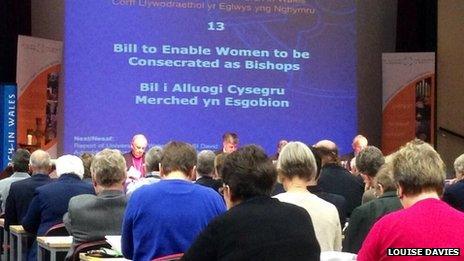Church in Wales backs women bishops
- Published
- comments
last attempt to bring in the change five years ago failed by just three votes
Women bishops will be allowed in the Church in Wales following a landmark yes vote.
Bishops within the Church tabled a bill calling for the change and it was finally accepted by its governing body after a previous vote in 2008 narrowly failed.
There were huge cheers in the hall as the result was announced.
In England, the issue is due to be discussed again in November. Ireland and Scotland both allow female bishops.
Despite female bishops being allowed in Northern Ireland and Scotland, none has been elected yet.
The Church in Wales' bishops wanted a second bill to allow the Church's constitution to be rewritten for traditionalist priests who do not want to be led by a woman.
But reformers successfully put forward an amendment earlier in the day to avoid delays in adopting the change during a meeting at Lampeter, Ceredigion.
Their amendment led to the straight yes-no vote
The governing body comprises more than 140 members and is made up of three separate divisions, with the six bishops, clerical representatives and non-clerical representatives.
The groups voted separately with a majority two-thirds vote required before the amended bill could be accepted.
Back in 2008, the move was defeated by just three votes but this time the vote was strongly in favour.
In the breakdown, the laity voted 57 for, 14 against, with two abstentions; the clergy section saw 37 voting for and 10 against, while the bishops voted unanimously in favour.
The Archbishop of Wales, Dr Barry Morgan, called it "an historic day for the Church in Wales."
He told BBC Wales he hoped it would be possible that no-one would be lost to the Church and said bishops would now be drawing up a code of practice.
"There are two things we've done today - firstly we've said it's possible for women to be ordained to the episcopate; that's a very important principle for the mission of the Church," said Dr Morgan.
"Secondly, we want to take care of those who find that decision difficult."
Dr Morgan praised the way in which the debate had been conducted and, addressing members, added: "I hope you will trust us as bishops to prepare a code of practice."
The bill was proposed by the Bishop of St Asaph, the Right Reverend Gregory Cameron, and seconded by the Bishop of Bangor, the Right Reverend Andy John.
And Bishop John said: "We can by God's grace ordain women to the episcopate. Thank you, governing body."
'More hospitable'
Bishop Cameron said the change would come into effect in a year, to allow time for pastoral care to be drawn up for those still opposed to women bishops.
"For too many years, sadly, the Church has been lagging behind," he said, admitting his surprise at the strength of mood within the governing body.
"I'm very glad we got the result we have today.
"The journey has been going in that direction for a little while," he told BBC Radio Wales
"The Church changes very slowly and you have to learn to live with that."

The vote was taken at a governing body meeting in Lampeter, Ceredigion
But one of those who spoke against, Dr Elliott King, said: "Personally I'm disappointed that the bill has passed but we have a great opportunity now over the next 12 months to work together to find a way forward for us all to stay within the Church."
Mary Stallard, co-director of St Giles' Centre for Religious Education and Faith Development in Wrexham, said she expected the move to "open things up in all sorts of ways".
She told BBC Radio Wales: "One of my daughters, who's 16, said spontaneously, 'this opens up a possibility for me, it makes me think that going into the Church might be something I would consider'.
"And I think all sorts of people will see this as an opening, something that makes the Church a little bit more hospitable. Anglicans never want to exclude anybody."
- Published12 September 2013